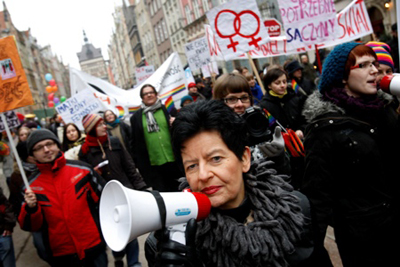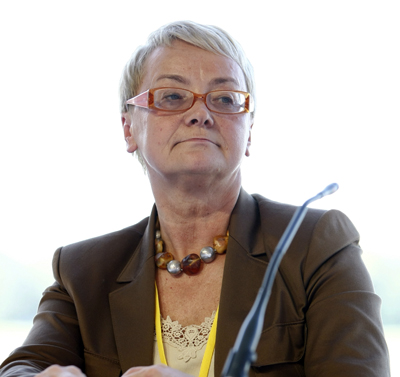In Search of the Right Ending… Posted by Anna on Feb 6, 2010 in Culture
Today I would like to introduce to you our brand new guest blogger – Adam Blomberg. He will be helping me out with the Polish Blog this month, because I think that after all this time of mostly Anna, you all must be hungry for something exciting and fun. And a new (and male at that!) point of view should make things fresh and interesting.
This is Adam’s first contribution to the Polish Blog, and after reading it I am sure will enjoy his posts as much as you do mine. If not more. (Yes, he’s that good!)
So, please put your hands together for Adam!!!
Adam, the floor is yours!
There are some things in the Polish language that you will never get right. You can learn your declensions by heart, you can get the spelling right, but sometimes it just won’t do. It’s when the language, the map that describes our world, actually meets the world… and doesn’t fit. The world is constantly changing while language patterns are deeply ingrained in people’s souls, in our brains, and in our dusty books.
The thing I am talking about here are female names for professions or positions of honor. This subject has been mentioned on this blog before, however in the light of the fact that this issue touches half of the human population (women), I thought it was a good idea to give the readers of this blog some more insight into the matter. In Polish, of course.
The style of addressing a woman-professor, woman-driver, or a woman-judge, woman-prime-minister or woman-MP (etc.) in Polish could be one of the trickiest things, even for native Poles. Sometimes it’s balancing on a thin line: someone might get offended.
It all began in the past, when as in most of the Western world, it was believed that men and women were created to perform different roles, and so they did. Men conquered the world, or pursued high-flying careers. Women rocked the cradle and provided domestic service. These prehistoric conditions have long since changed. But the language hasn’t changed that much – just yet – to fit them.
Therefore the Polish language is inconsistent with those profession names. Various occupations have only one generally accepted gender version:
- for instance: prezes (company president), premier (prime minister), sędzia (judge), pełnomocnik (legal agent), kierowca (driver, note – not tram/train driver), referent (sub-species of office worker), górnik (miner), doktor (PhD holder) – have no apparent female version
- and przedszkolanka (kindergarten teacher) – has no male version.

Joanna Senyszyn – europoseł – EU Parliament Member
There are of course several solutions, some more popular than others. The tricky bit is, that usually women strongly prefer one of these: either because of their strong feminist views or because of version sounds more respectable. And the style one chooses to use also might reveal their political stance on the issues of feminism. As it were the feminists who stress this matter and point to the need for female naming conventions.

Henryka Bochniarz – prezes – company president (Polska Konfederacja Pracodawców Prywatnych
Lewiatan – Polish Confederation of Private Employers)
Solutions:
1. The most popular thing people do, is to add the word pani (lady, or Mrs) before the positions of prestige or use the male form altogether: so we would have pani prezydent, pani sędzia, pani premier, pani pełnomocnik, pani doktor, pani poseł. As the male version sounds prestigious most people use the male version even if a female word does exist – so that it sounds better: for instance: pani psycholog (psychologist), pani stomatolog (dentist), pani nauczyciel (teacher);
2. Some women prefer, and some feminist periodicals promote, the use of – let’s call it the “-ka” type of endings, that are based on a pattern already used in the Polish language for some female positions (nauczycielka) and extend it: prezydentka, prezeska, premierka, doktorka, posłanka… and we have a problem with sędzia – they would probably use the word sędzina (usually means the wife of a judge).
Many women however would not use these words as they sound and look like diminutives. As if a woman president was not a proper president but “little president”. A prezzie. Some women argue that these words will no longer sound like diminutives if we do use them and get used to them. Others point that prezydentka is actually a direct equivalent of prezydentek (little president, dwarf-president) – rather than prezydent. And this conclusion was the basis for solution number three.
3. The third solution is the least popular one (as it introduces a completely new thing), but is the most complex, and is argued to be the most logical, without any prestige loss. It proposes adding letter “-a”: prezydenta, prezesa, doktora, sędzia, rzecznika, referenta, psychologa, górnika, posła, nauczyciela.
I will leave with you with this question: Who is Anna Ikeda?
– bloger?
– pani bloger?
– blogerka?
– blogera?
Which version do you prefer? And why?
PS. Anna’s comment – the third solution reminds me of how it works in Spanish: señor-señora, profesor -profesora.
PS2. Wasn’t it an awesome first post?

Build vocabulary, practice pronunciation, and more with Transparent Language Online. Available anytime, anywhere, on any device.




Comments:
Thomas Cremers:
Logically I would go for the 3de option (blogerka) just because of it’s consistency.
And coming from a language that regularly makes changes to spelling and grammer (regular compared to other languages) I know that you get used to new sounds or structures very fast. Before you know it you can’t even believe it ever sounded close to demeaning.
kuba:
Good first post. So the best way to learn Polish is go there and immerse yourself in it. The best is to just speak the language and let the chips fall where they may. Mistakes or not you will be understood or asked to repeat it.
Maria Clara Soares Correia:
Excellent post and more universal subject than you might think. In Portuguese we have some similar problems (and probably other languages too). Languages always have to follow evolution of societies, not the opposite. Personally, I prefer different words for female jobs. We are not meant to copy men! And do we still have to proove that we are as able as men?!
Love this blog!
Thank you all. Welcome, Adam!
Clara
el:
blogerka:)
Lorraine:
I think Anna should be called “blogera”. Here’s why:
– bloger: In English, adopting the male form of profession works, because English isn’t a gendered language (so everyone’s an actor now). This doesn’t work in Polish, though, since Polish is a gender-specific language.
– pani bloger: Unless “pan bloger” is used for men, “pani bloger” shouldn’t be an option.
– blogerka: I agree that “+ka” is a diminutive. Such language perpetuates negative stereotypes about women.
– blogera: Works for me.